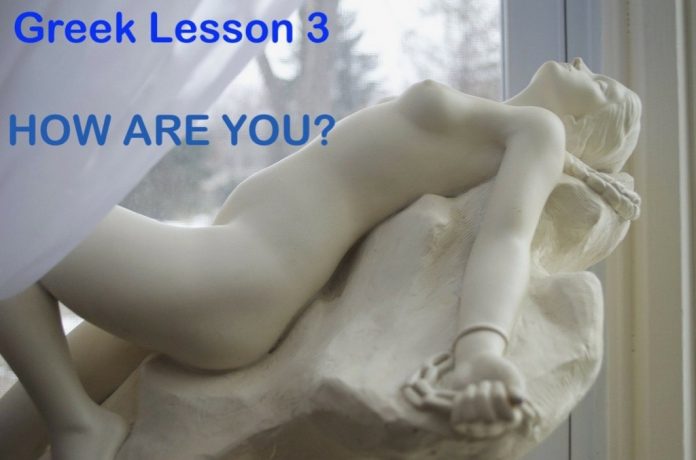When someone asks, “How are you?” in Greek, what can you say? Well, this Greek lesson will teach you how to respond if asked.
Alternatively, you may want to know how to ask this question yourself.
There are a few different ways to ask the same thing, though the most popular way would be to say Ti kanis?
This unique Greek lesson teaches you how to speak Greek by focussing on speaking the words shown in blue and red text. This is the main lesson. All you need to do is say the words out loud ten times.
Just say the words as you see them, and you will be speaking Greek in no time. It’s an easy way to learn Greek, and it will teach you how to speak Greek super fast.
To better understand how this simple method works, you can read the introduction in Greek lesson 1 – Greetings.
7 Best Ways to say “How are you?” in Greek
Before we learn about how you can respond to “How are you?” in Greek, let’s take another look at the different ways you or someone else can ask the question.
Understanding different ways to say “How are you?” in Greek will alert you when someone asks the “How you are?” question. You can then use one of the replies shown below.
The first Greek lesson on Greetings as part of an ongoing series of Greek lessons has already taught a couple of different ways to say “How are you?” in Greek.
This is because asking someone “how are you?” is often combined with an initial greeting, such as hi, how are you?”
So let’s take a more in-depth look at some of the different ways you can ask someone how they’re doing in Greek.
After that, we can then learn about some different ways to respond to the “How are you?” question.
Hi, how are you? (informal)
Ya, ti ka-neis
Ya, ti ka-neis
Ya, ti ka-neis
Ya, ti ka-neis
Ya, ti ka-neis
Yah, tee kah-nis
Yah, tee kah-nis
Yah, tee kah-nis
Yah, tee kah-nis
Yah, tee kah-nis
Ti kanis is the most popular way to say “How are you?” in Greek.
It was taught in lesson 1. You informally say this to one person.
“Ti kaneis” means both “how are you” and “what are you doing?”
How are you? (formal)
Ti kahn-ne-te
Ti kahn-ne-te
Ti kahn-ne-te
Ti kahn-ne-te
Ti kahn-ne-te
Tee kar-ne-teh
Tee kar-ne-teh
Tee kar-ne-teh
Tee kar-ne-teh
Tee kar-ne-teh
Used if you want to be more polite or if you are speaking to an older person. Or if you are talking to more than one person.
How’s it going? (informal)
Ti yi-ne-teh
Ti yi-ne-teh
Ti yi-ne-teh
Ti yi-ne-teh
Ti yi-ne-teh
Tee yi-ne-te
Tee yi-ne-te
Tee yi-ne-te
Tee yi-ne-te
Tee yi-ne-te
Ti yi-ne-teh is a more informal way to ask how’s it going. Greeks definitely say it to their friends, parents, or people they know well.
In general, if you’ve met someone a couple of times in the past, it’s one of the common ways to ask them how they’re doing.
It can be used when talking to one person or many.
How’s it going? What’s up? (informal)
Pos-paye
Pos-paye
Pos-paye
Pos-paye
Pos-paye
Pos-paei
Pos-paei
Pos-paei
Pos-paei
Pos-paei
It can be used when talking to one person or many.
Also taught in Greek lesson 1 – Greetings.
How are you? (informal)
Pos ee-seh
Pos ee-seh
Pos ee-seh
Pos ee-seh
Pos ee-seh
Pos ee-se
Pos ee-se
Pos ee-se
Pos ee-se
Pos ee-se
How are you? (formal)
Pos ist-e
Pos ist-e
Pos ist-e
Pos ist-e
Pos ist-e
Pos ee-ste
Pos ee-ste
Pos ee-ste
Pos ee-ste
Pos ee-ste
How are you? (informal)
Ti Laye
Ti Laye
Ti Laye
Ti Laye
Ti Laye
Tee Lai
Tee Lai
Tee Lai
Tee Lai
Tee Lai
It can be used when talking to one person or many.
More ways to ask “How are you?” in Greek
Ola kala? – Is everything ok? (You can use it for one person or many. Note: Ola means everything in this case.)
6 Ways to Respond to “How are you?” in Greek
The responses you see here should have you covered for most scenarios.
Fine, and you?
Karla, esi
Karla, esi
Karla, esi
Karla, esi
Karla, esi
Karla, es-si
Karla, es-si
Karla, es-si
Karla, es-si
Karla, es-si
Karla means fine, good, well.
esi means – and you.
I’m fine, and you?
Karla imeh, esi
Karla imeh, esi
Karla imeh, esi
Karla imeh, esi
Karla imeh, esi
Karla im-meh, e-see
Karla im-meh, e-see
Karla im-meh, e-see
Karla im-meh, e-see
Karla im-meh, e-see
Kala imeh is probably the most common response when answering a how are you question.
Note: The informal version – And you? is “E-see?”
If you want to be more formal, you should change it to: And you? “E-sees?”
Very well, thank-you, and you?
Poli karla, ef-har-iss-tor, esi
Poli karla, ef-har-iss-tor, esi
Poli karla, ef-har-iss-tor, esi
Poli karla, ef-har-iss-tor, esi
Poli karla, ef-har-iss-tor, esi
Pol-lee karla, ef-har-ist-tor, es-si
Pol-lee karla, ef-har-ist-tor, es-si
Pol-lee karla, ef-har-ist-tor, es-si
Pol-lee karla, ef-har-ist-tor, es-si
Pol-lee karla, ef-har-ist-tor, es-si
Efharisto means thank-you. You can include it if you want, or you can leave it out if you prefer.
So and So
Etsi ketsi
Etsi ketsi
Etsi ketsi
Etsi ketsi
Etsi ketsi
Et-si ket-si
Et-si ket-si
Et-si ket-si
Et-si ket-si
Et-si ket-si
Note: In written language, this is “etsi kai etsi” (so and so), but the “ai” from “kai” is cut in spoken language (because they are followed by the “e” vowel on second “etsi”). So, pronouncing it is really, “etsi ketsi.”
I’m ok, and you?
Im-meh endaxi, esi
Im-meh endaxi, esi
Im-meh endaxi, esi
Im-meh endaxi, esi
Im-meh endaxi, esi
Ee-meh endark-si, e-see
Ee-meh endark-si, e-see
Ee-meh endark-si, e-see
Ee-meh endark-si, e-see
Ee-meh endark-si, e-see
“I’m not doing good” or “Not so good”
Then im-meh karla
Then im-meh karla
Then im-meh karla
Then im-meh karla
Then im-meh karla
Then im-meh kala
Then im-meh kala
Then im-meh kala
Then im-meh kala
Then im-meh kala
In other words, I’m not fine. This is the way to go when you want to say that you’re not doing that good.
For instance, you have a cold, you have family issues, you’ve had an argument with someone, etc.).
Saying “Then im-meh kala” isn’t as bad as saying “Halia,” but there’s definitely something bothering you.
Halia is mentioned in the list below as another way of responding to how are you.
More ways of responding to How are You?
Im-meh karla – I’m doing well (Note: this is the same as saying Karla im-meh. It’s just another way of saying the same thing.) Both are fine. There’s no difference between them, and you can use both. Let’s say that 55% kala imeh esi, and 45% Imeh kala, esi. But there’s no difference at all.
Nai kala – Yeah good
Or-hee kako – Not bad
Ar-keta kala – Pretty good
Karl-os – Alright
Oraia – Nice (can also mean fine, good, beautiful). Oraia is not rare, but usually, you go with the “Kala” versions. While it’s super okay to use it, in general you’d go with “Kala.” It is similar in English: you say “I’m doing good” more often than “Nice” when you’re asked. But you can use “Oraia” too.
Mia hara – Very well (great). Pure joy. Greeks also use it as fine.
Kal-ootsika – Not so bad
Ohi ke tor-sor kala – Not so good
Har-lia – Halia is very strong. It means that you are doing really, really bad or “feeling like total crap.” One has to feel truly bad to say it.
Popular Ways to say “How are you? in Greek Recap
Ti kanis – How are you? (informal) – τι κάνεις
Ti ka-ne-te – How are you? (formal)
Ti yi-ne-teh – How’s it going? (informal)
Pos paye – How’s it going? (informal) – Πώς πάει
Pos ee-seh – How are you? (informal) – Pós eísai
Pos ist-e – How are you? (formal)
Ti laye – How are you? (informal)
Popular Ways to answer “How are you? in Greek Recap
Karla, esi – Fine, and you? – kalá kai esý
Karla im-meh, esi – I’m Fine, and you? – Eímai kalá, esý
Poli karla, ethharisto, esi – Very well, thank-you, and you – Polý kalá, efcharistó kai esý
Etsi ketsi – So and so – Etsi kai étsi
Im-meh endaxi – I’m ok – eímai entáxei
Then im-meh kala – I’m not fine (I’m not feeling well) – den eímai kalá
“How are You?” and Answers – Lesson Conclusion
All you really need to remember is how to say “Ti kanis?” in Greek if you want to keep things simple.
If you want to answer the how are you question easily in Greek, say “kala.” This means fine.
If you’d like to know how the other person is doing, or you want to be polite and ask them the same thing in return if they haven’t answered already, just say “kala, esi,” which means fine, and you?
Key Greek words/phrases/sentences taught in LESSON 3: 11
Note: The Lesson 3 count doesn’t include two ways to say “How are you?” because “Ti kanis?” and “Pos paye?” were covered in the very first Greek lesson.
Total number of key Greek words/phrases/sentences from all lessons so far: 26
Other Greek Lessons available include:

Special thanks to George from Letters to Barbara for reviewing and improving this Greek lesson.
Pin it … Share it






